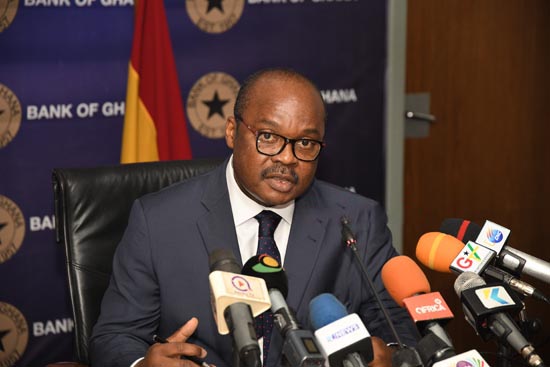The Bank of Ghana has said that its 2022 financial losses was because it took a 50 per cent haircut during the first round of the Domestic Debt Exchange Programme (DDEP).
Addressing the media on the BoG’s 2022 financial results, the Director of Research at BoG, Dr Philip Abradu Otoo said the central bank decided to step in and take a hit for the country to enable it secure the deal with the International Monetary Fund.
As part of measures to secure the IMF deal, the government was expected to restructure both its domestic and external, a move which is aimed at bringing public debt to sustainable levels by 2028.
Dr Otoo said during the initial stages of the debt restructuring discussions, the plan was to have a 10 per cent haircut on principal, 10 per cent reduction in coupon rates and 10 years’ extension of the tenor, and this was supposed to be applicable to everyone.
“As a country, we did not want the haircut on the principal so that was shelved and this meant that we needed to go back to the drawing board.
“We had to look at what combination will be feasible to ensure that our debt matrix reaches sustainable levels to enable us secure the IMF deal and that is why we had to take a 50 per cent haircut,” he explained.
He said the central bank had to step in for the country and ensure that the IMF deal goes through.
“The BoG acted as the last absorber and as the last absorber, the external partners are also watching.
They also need some form of treatment but needed to see how it will impact on domestic institutions first before agreeing to some form of debt restructuring.
“What happened to us will send a signal that they need to work fast on it because the biggest public policy institution took the biggest haircut,” he stated.
Dr Otoo also gave an assurance that the second round of the Domestic Debt Exchange Programme would not have any impact on its balance sheet for 2023.
This is because the central decided to take a one-time hit for all of its DDEP losses in the 2022 financial accounts.
The DDEP which seeks to bring the country’s debt to sustainable levels by 2028 has taken a hard hit at banks in the country and the financial sector regulator has not been spared from the harsh effects of the programme.
The 2022 financial results of the BoG showed that it made a loss of GH¢60.81 billion mainly due to the DDEP and the depreciation of the local currency.
Dr said GH¢53.1 billion of the losses was as a result of the DDEP.
He said the losses came from the BoG’s marketable instruments, non-marketable instruments, and cocoa bills.
The DDEP saw the government swap 12 old bonds valued at GH¢82.99 billion for new ones at reduced coupon rates and longer tenors and this affected all the 23 banks in the country, some of whom had as much as 50 per cent exposure in government bonds.
Audited 2022 accounts of the banks showed that 16 out of the 23 banks operating in the country recorded losses.
The total post DDEP losses of the banks is around GH¢37.7 billion.
Second round of DDEP
The government has recently commenced the second round of the DDEP which includes the restructuring of local dollar denominated bonds, restructuring of cocoa bills, and the restructuring of debt owed to Independent Power Producers (IPPs).
Dr Otoo said luckily for the central bank, it is not exposed in any of these and would therefore not have any impact on its financials in 2023.
He noted that while the BoG was exposed in cocoa bills, it had already taken that hit in its 2022 financial year.
“The second round of the DDEP is targeted and fortunately for us, we are not in that space.
We have taken a one-time hit for almost everything and we don’t expect anything else to impact our balance sheet.
“We have exposures in cocoa bills but we have already taken that hit in our balance sheet for 2022,” he explained.



